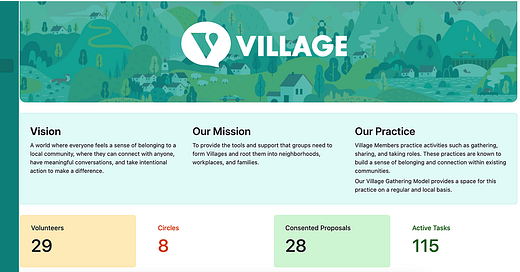From our Village Toolkit: ViCo
How VillageCo Uses Airtable to Power Sociocracy and Community Governance
In today’s evolving landscape of community-led innovation, VillageCo is pioneering a new approach to governance—one that mirrors the very values it aims to inspire in the micro-communities it supports. Rooted in the principles of sociocracy, VillageCo’s organizational model fosters shared authority, transparency, and consent-based decision-making. To bring these ideals into everyday operations, VillageCo relies on a digital foundation that is as adaptable and human-centered as its mission. At the heart of that infrastructure? ViCo, VillageCo’s sociocratic governance fused with the digital power of Airtable. Guided by Emma Sutton, Jason Sears and Michael James, VillageCo has elevated its governance by infusing sociocracy into tech to propel their mission.
Airtable, a flexible no-code database platform, is more than a spreadsheet alternative. For VillageCo, it’s a living framework—one that reflects and reinforces the dynamics of a sociocratic organization, powering everything from proposal tracking to cross-circle collaboration.
Want to learn more about sociocracy? Explore our article below:
Sociocracy structures organizations into semi-autonomous circles, each responsible for a specific domain—like Mission, Platform, Communications, Finance, or Fundraising. Within each circle, decisions are made by consent: a proposal moves forward unless a member raises a reasoned objection. Roles are clearly defined, and authority is distributed equitably.
Each circle operates within its own dedicated Airtable workspace, customized to suit its specific domain. Proposals are tracked, meeting notes are logged, tasks are assigned, and timelines are visualized—all in one place. This circle-specific autonomy fosters clarity and ownership, while maintaining organization-wide visibility and cohesion.
Here is an example proposal to create a better Onboarding process for our Volunteers for example:
Workflows within Airtable mirror the steps of sociocratic consent; proposal is drafted, shared, and reviewed and members record consent or raise objections—each step captured transparently within the platform. Every decision leaves a digital trail, reinforcing auditability and trust.
Airtable also houses a clear map of roles and responsibilities, ensuring everyone knows who’s accountable for what. This not only strengthens alignment but reflects sociocracy’s core tenet of equivalence: those affected by a decision are meaningfully involved in shaping it.
Through linked records and shared views, Airtable enables smooth communication between circles. For instance, a campaign strategy developed by the Communications Circle can be seamlessly submitted to the General Circle for consent—no email chains, no context-switching, just smooth, collaborative flow. Despite the automisation of the sociocratic infrastructure provided by Airtable, VillageCo still relies on face to face meetings and other interpersonal practices, because at its core, VillageCo’s mission roots come from community and connection.
From dynamic proposal pipelines to real-time election tracking, VillageCo continually adapts Airtable to reflect its internal rhythms. The platform’s modularity means it scales with the organization—evolving alongside its structure, needs, and ambitions.
VillageCo’s use of Airtable is more than a technical choice—it’s a philosophical one. By integrating a flexible, transparent tool into its sociocratic structure, VillageCo ensures that its internal culture mirrors the values it wants to bring into the world: community, consent, and co-creation.
Want to follow our journey and understand VillageCo at a deeper level? Subscribe to our Substack below:
As more organizations embrace decentralized, participatory models, VillageCo’s approach raises some important questions:
How might digital tools shape the way we experience governance—not just how decisions are made, but how they feel?
What happens when authority is truly distributed—what new forms of leadership emerge?
What are some challenges we might face when introducing platforms like Airtable when onboarding volunteers?
Share our article to discuss with your mutuals or comment below to start a conversation:







Shout out to Emma (https://marjoriedesign.com/) who made this custom built sociocracy base and shares a template of it for free in the Airtable Universe - contact her for more info. It's slick!!
Love it!! nice reference to the previous article too!! haha that's funny because the last question will be an aspect in the example proposal in the image! (was that done on purpose? hm......)